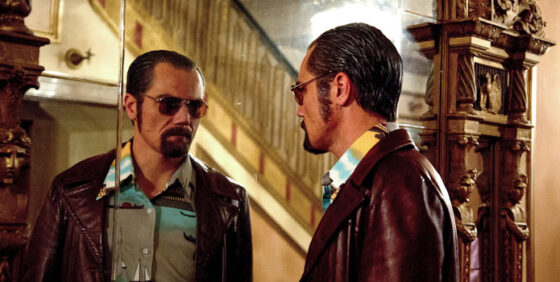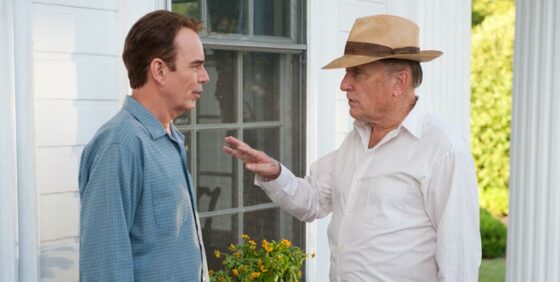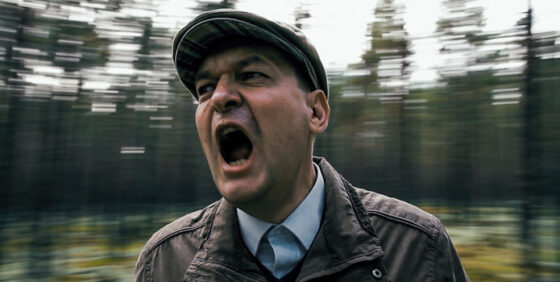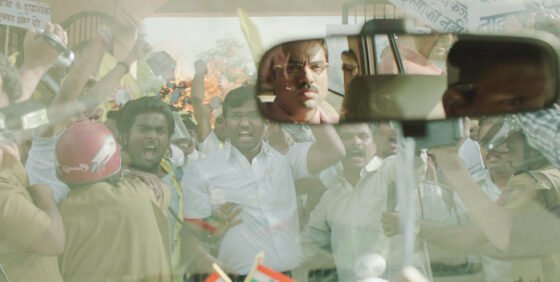TIFF Day 1: La cinquième saison | I Declare War | The Iceman | Jayne Mansfield’s Car | Looper | More Than Honey | Mushrooming | Paradise: Love | Shanghai | Three Sisters
La cinquième saison (Peter Brosens, Jessica Woodworth, Belgium/Netherlands/France)—Wavelengths
By Mark Peranson
Once upon a blue moon there comes along a very special film so wrong-headed, so deeply, deeply ridiculous, but made with the utmost confidence, that a wide swath of critics, programmers, and spectators mistake its balls-out look-at-me! posturing for high-minded, state-of-the-earth profundity. Oftentimes this unique breed of film goes on to win Oscars, major film festival accolades, or in the case of Darren Aronofsky’s dreck-fest Black Swan (2010), both. Though they’ve tended in the current direction in films like 2006’s Khadak (Mongolia) and 2009’s Altiplano (the Andes), nothing in the careers of directors Peter Brosens (who began as a documentarian) and Jessica Woodworth has prepared us for the full-blown gaga madness of The Fifth Season, a bogus and pompous work deep to its core that tracks a small Belgian village’s descent into communal and environmental surrealism.
A realistic, even mildly whimsical portrait of Brosens’ homeland simply could not suffice to merit a Venice competition slot: what is required is a thorough drenching of the landscape with a dark, fabulistic Tarkovskian veneer that peels away under the slightest breeze. But man, this drooling puppy has it all: young lovers caught in a maelstrom of chaos; a handicapped child; apocalyptic environmental portent; wacky Belgian village rituals; Belgian line-dancing; Belgian human sacrifice; wide-angle master show-stopper plans-séquence; and, spoiler alert, ostriches. What it’s doing taking up a Wavelengths slot, for that matter, I can’t say either, but The Fifth Season is a conversation-starter, for sure. I could go on, but I assume many others will— Godspeed to them, and to the filmmakers. By the way, there are only four seasons.
I Declare War (Jason Lapeyre, Robert Wilson)—Vanguard
By Kiva Reardon
This shall be kept brief, because I Declare War should have been. A group of Canadian boys (and one token girl) play at war one afternoon. Sticks become shotguns and water balloons grenades, but as the day progresses the imagined violence seeps into the real world. This is a fine premise for a short film or a music video (see Is Tropical’s “The Greeks”), but at feature length I Declare War strains to remain provocative, or even engaging. While raising issues such as bullying and relentlessly referencing video-game culture, directors Jason Lapeyre and Robert Wilson don’t quite explore how such hot-button topics might be affecting or shaping their characters’ fantasies; it’s inventory, not investigation. Instead, the film apathetically shrugs “Boys will be boys.” Worse, the film relies on the notion that homophobia, racism and sexism are funny when spewed from the mouth of prepubescent males, as if they won’t grow into men who risk maintaining these views, or even merely into filmmakers who make asinine and immature features. I declare bullshit.
The Iceman (Ariel Vroman, USA)—Special Presentation
By Mark Peranson
Michael Shannon. (winona ryder.) Michael Shannon. Michael Shannon. Michael Shannon. Ray Liotta. Michael Shannon. Michael Shannon. Michael Shannon. David Schwimmer with a moustache! Michael Shannon. Michael Shannon. Michael Shannon. Ray Liotta. Michael Shannon. Michael Shannon. Michael Shannon. James Franco? Michael Shannon. Michael Shannon. Michael Shannon. Michael Shannon. David Schwimmer in a yellow track suit! Michael Shannon. Michael Shannon. Michael Shannon. Stephen Dorff?? Michael Shannon. Michael Shannon. Michael Shannon. Michael Shannon. Chris Evans?! Michael Shannon. Michael Shannon with a moustache. Michael Shannon. Chris “Freezy” Evans. Michael Shannon. Michael Shannon. MICHAEL SHANNON. (winona ryder.) MICHAEL SHANNON. MICHAEL SHANNON. Michael Shannon. Michael Shannon with a full beard.
Jayne Mansfield’s Car (Billy Bob Thornton, USA/Russia)—Special Presentation
By Carlos Reveigiero
From the moment we see Kevin Bacon as an LSD-addled hippie and Vietnam protester trying to convince us that he is fifteen years younger (and we see him quite early in the film), we have to wonder if the first writing-directing effort from Billy Bob Thornton since Daddy and Them (2001) is too eccentric and charming or too old and artificial. Despite its retrieving some images from All the Pretty Horses (2000) from our memory, chances are the latter. Anyway, the actors in Jayne Mansfield’s Car, including the director himself, make a concerted effort to set the tone for this tragi-comedy set in the American South in the late ’60s, when the counterculture was in its prime but the Alabaman Caldwell clan is more concerned about the culture clash between their down-home vulgarity and the proper manners of the British Bedford brood. The two families meet each other for the first time to bury their mutual matriarch Naomi, who 22 years before abandoned her husband Jim Caldwell (Robert Duvall) and three kids and ran away to marry Englishman Kingsley Bedford (John Hurt). What starts as farce turns gradually into a sort of Tennessee Williams play in which the traumas and dramas of war, embroiling three generations, finally reach the surface. Thornton deals with this bygone literary and cinematic tradition at his own risk, stepping out of this mode only for the sake of a controversial ending and for his own performance as dim-bulb son Caldwell son Skip, who shares a lovely moment of cine-acting in a garage with Frances O’Connor. And why should we care about this fairly well executed screenplay, with no interesting mise en scène at all, if not for the joy of observing great actors at work?
Looper (Rian Johnson, USA)—Gala Presentation
By John Semley
That there is simply so much going on in Looper—Time travel! Telekinesis! Hover-bikes! Vagrant raids!—is one of the film’s great strengths. Rian Johnson’s futuristic neo-retro-noir is entirely overstuffed, and yet never to a fault; it crackles with energy of a filmmaker giddily playing with all his live ideas, his goofy enthusiasm inflecting even the film’s more sullen, serious passages. Looper opens in a near future where organized crime runs ubiquitously rampant and people absorb narcotics through eyedroppers. (Why not?) Joseph Gordon-Levitt is the eponymous “looper,” a hitman hired to blast away marks sent back in time by his future bosses. He’s the consummate pro, until he comes face to face with his future self (Bruce Willis), who has sent himself back in time in order to kill a young child who will grow up into a criminal overlord responsible for killing his wife (Qing Xu).
Johnson seems refreshingly uninterested in the mind-numbing mechanics of his premise. (“I don’t want to talk about this time-travel shit,” Willis moans to his younger self. “We’ll be here all day, making diagrams with straws.”) Johnson lets a few of his many spinning plates wobble—he never sells either of the love stories, especially because Willis’ paramour is little more than an Orientalized ideal—but he keeps his compositions clean, his pacing fairly tight (a montage showing Gordon-Levitt slouching into stone-jawed Willisian form is especially nifty), and introduces his more ludicrous elements at a rate that sustains the film’s air of half-respectable frivolity.
More Than Honey (Markus Imhoof, Germany/Austria/Switzerland)—TIFF Docs
By Hannes Brühweiler
Markus Imhoof’s More Than Honey joins the current wave of doomsday documentaries that shed light on urgent and alarming environmental developments such as food waste or climate change. Prompted by the mysterious and massive death of bees that made headlines all over the world in recent years, Imhoof tackles this unsettling subject in the style of an informative documentary. Speaking to farmers, scientists and beekeepers, Imhoof argues that bees are the victims of civilization’s success and shows how their disappearance affects nature and ultimately mankind itself. In one particularly dystopian scene we observe Chinese farmers hand-pollinating fruit trees in regions where all the bees have died. It’s like watching a scene from a science-fiction film—which is made explicit at the end, when CGI bees are shown flying into outer space, leaving Earth behind.
It is the images that prove to be More Than Honey’s most striking feature. Using state-of-the-art filmmaking equipment, Imhoof places tiny cameras inside hives and succeeds at following bees in flight. The images he is able to capture are stunning, and the film works best when the story is told through purely visual means. Alas, the screenplay struggles to keep up with all the illustrative delights; the filmmaker’s globetrotting reporting rarely allows his interviewees time for the briefest of quotes, which dangerously border on flat superficiality. More Than Honey may be visually gripping, but it’s ultimately a rather conventional piece of cine-activism.
Mushrooming (Toomas Hussar, Estonia)—Discovery
By Violeta Kovacsics
Scheduled by his advisors to appear on a silly game show, career politician Aadu (Ravio E. Tamm) decides to take a detour into the woods with his wife to go mushroom-picking. Bad idea: they get lost in the forest, where things quickly take a turn for the absurd. Mushrooming is an attempt at political satire, even though its politics are not specific. The hapless Aadu is a figure of general ridicule, and the other characters are extremely eccentric, especially the clueless punk who joins him and his wife as a third wheel during their odyssey through the woods. Director Toomas Hussar’s comic style isn’t affectionate or generous: he’s going for full-on black humour, and Mushrooming is indeed closer to the surreal misanthropy of Channel 4’s Black Mirror than to the mostly anodyne run of American “political” comedies. To wit, however its aesthetics also feel bound to television: the shots are impersonally composed, and Hussar cuts between his major locations (the forest and the city) without much rhythm. He does stage some nice physical gags, however—a bit with the wife miserably covered in flour, or a fight between Aadu and a weird cabin owner—and the spaces are at least well-visualized, especially the posh environs of the Estonian ruling class. But the best comedies are those that branch off in multiple directions or reveal that they’ve had something up their sleeve all along; by contrast, Mushrooming stays locked into a single comic idea and reveals little. Like his wandering characters, Hussar seeks the path to inspiration, but he only ends up briefly catching sight of his intended destination.
Paradise: Love (Ulrich Seidl, Austria/Germany/France)—Contemporary World Cinema
By Mark Peranson
The stranger-in-a-strange-land template has been adopted by Ulrich Seidl, whose Paradise: Love (the first installment in a trilogy) focuses on Teresa (a very game Margarethe Tiesl), a plump middle-aged Austrian vacationing on a “comfort safari” to always-sunny Kenya, the “Hakuna Matata” and “Jambo” Swahili-speaking land of zebra-costumed troubadours, wild monkeys, and “beach boys.” This is no mere seaside vacation: Seidl’s clash of cultures creates a fertile dramatic and thematic object, as Teresa is at the same time a signifier of the historic oppressor (in a national sense, as a white colonizer) and the oppressed (in the universal sense, as a woman). Seidl’s lead—to call her revolting or fat is seriously an insult to femininity—starts off looking for a “boyfriend experience,” and in her dealings with the Kenyan beach boys, she at first attempts to recolonize them sexually, hilariously attempting to instruct them in how to make love her way, tender and soft, not pawing like an animal. A fair part of the film is literally didactic, consisting of her constant verbal colonizing of the Kenyans through Austrian German lessons (which is why, of the many nationalities that will despise this film, the Germans will hate it the most, not least due to their lack of a sense of humour).
The natives, however, are restless, and Seidl’s naïve heroine repeatedly wills herself to see her situation as anything but a pure economic exchange: what she’s involved in is prostitution, clear and simple, a relationship Seidl clarifies with each man’s increasing financial demands. Paradise: Love is Seidl’s most straightforward comedy, which, more so than Hong, makes sublime use of the foreign tourist’s quandary that in the Third World the locals are simply out to exploit the visitors, who they see as cash cows, figuratively and literally. They are truly the big-game hunters. (The sight of the Kenyans standing on the beach, a few feet off the resort’s property, or circling on their motorbikes like hungry vultures outside the compound’s gate, typifies Seidl’s realist-based political correctness.) Teresa’s journey is her struggle to overcome denial, with her sexual relations assuming a repetitive, therapeutic quality; the tragedy in this is that even once she becomes most aware of her situation, her lover can’t deliver. “Don’t expect too much” is a good motto when approaching any film, and while Paradise: Love does feel slightly elongated, final judgment is reserved until all three parts are on display. Seidl’s original conception was to include all sections in one long film; the equally excellent second part, Paradise: Faith, unspooled in Venice, and the third should be done for Berlin 2013.
Shanghai (Dibakar Banerjee, India)—City to City: Mumbai
By Michael Sicinski
A subtle, somewhat neo-classical example of political cinema from the land of Bollywood, Banerjee’s film is a new film adaptation of Vassilis Vassilikos’ 1967 novel Z, and not a remake of Costa-Gavras’ film. By returning to the source material, Banerjee is able to avoid some of the realist-thriller excesses of the original film in favour of a complex tone that perfectly captures a critical moment in Indian cultural development. Dr. Ahmedi (Prasenjit Chatterjee) is the leftist expat who has returned to speak out against IBP, a massive business park that will displace thousands of lower-class villagers. After he is killed, his former student (Kalki Koechlin) fights for justice while an upright inspector (Abhay Deol) ignores entreaties to sweep the assassination under the rug. Neither Bollywood nor “parallel cinema,” Shanghai stakes out a tense naturalism wherein ordinary individuals make logical, even inevitable choices, considering they are locked inside a corrupt post-socialist free-for-all, the profit motive warping ordinary life beyond all reason. (The title is semi-metaphorical, the mythic neoliberal mecca that the financiers want Mumbai to become.) In a sly bit of commentary on India’s society of the spectacle, Shanghai only uses musical numbers as garish displays of power or deception. Some Hindi critics have taken Shanghai to task for its abstraction and myopia, and not without reason: it tends to cast the poor as a fickle mob, marking true activism as the province of the educated bourgeoisie. While not an accurate portrait of Indian resistance today, Shanghai provides a complex portrait of the power base, a hobbled Left, and the funhouse mirror of institutionalized cynicism.
Three Sisters (Wang Bing, France/Hong Kong)—Wavelengths
By Shelly Kraicer
Wang Bing confirms his mastery of the documentary form with his new film Three Sisters. A work of sustained observation and exquisite empathy, the film takes us deeply into worlds most of us have barely imagined. In the high mountains of the remote western Yunnan province of China, Wang and his two cameramen discovered a family of three little sisters. The eldest, Yingying, is ten; the middle sister Zhenzhen is six, and the youngest, tiny Fenfen, is four. Their father is away working in a distant city; mother seems out of the picture. So it’s just these three girls who make up a complete functional family. Living in utter poverty (their home is a cave-like dwelling—dark, dirty, littered with root vegetables, shared with their few scrawny domestic animals), they work hard, constantly, in dirt, exhausting themselves with the daily labour of subsistence agriculture. There is a neighbouring grandfather and aunt with whom they sometimes eat. But what we see is close to a pure world of little children forced prematurely into the most difficult kind of premature adulthood. The film’s tone is anything but despairing, and the absolute opposite of condescending. There is a kind of invincible energy, a life force that pushes our three heroines to survive, and Wang captures their world with unimaginable beauty and a compassionate, engaged, committed eye.
cscope2











